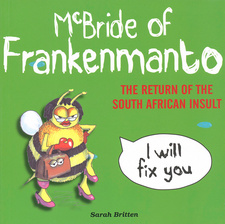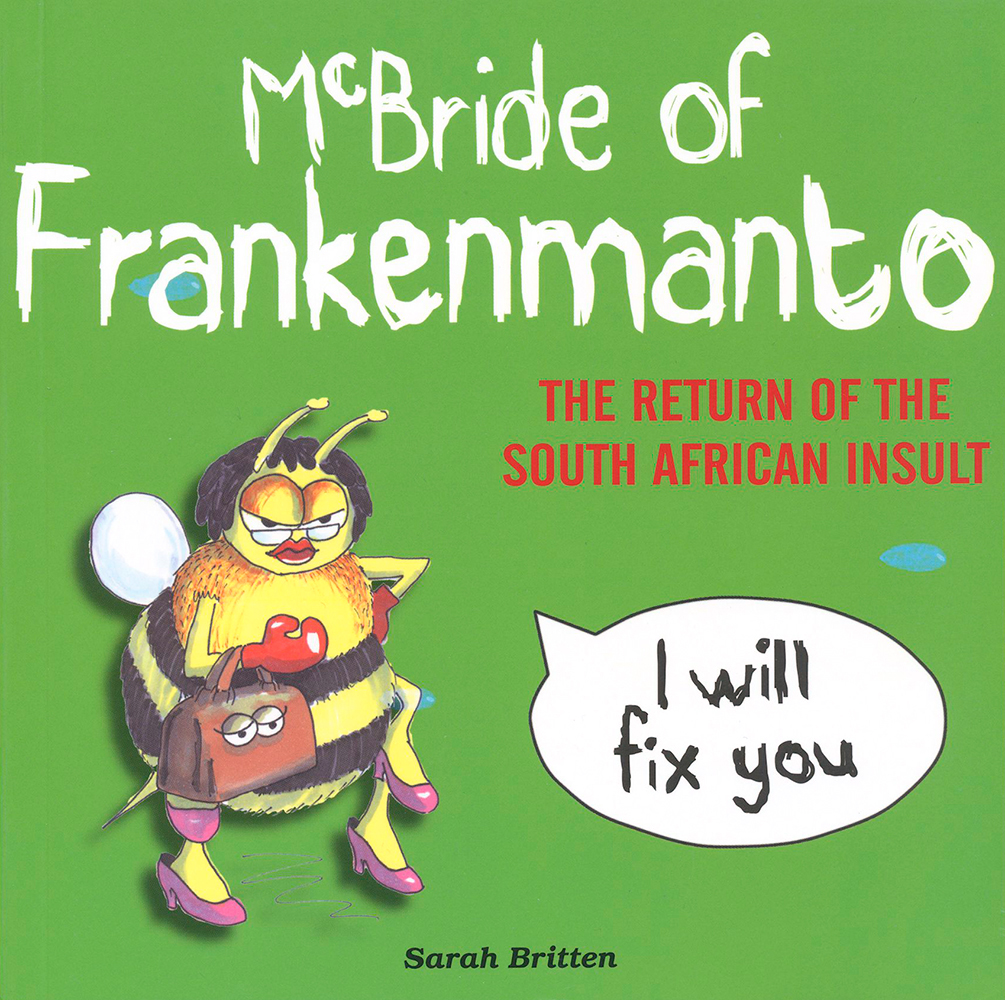McBride of Frankenmanto: The Return of the South African Insult, Sarah Britten

McBride of Frankenmanto: The Return of the South African Insult, Sarah Britten. 30° South Publishers (Pty) Ltd. Johannesburg, South Africa 2007. ISBN 9781920143183 / ISBN 978-1-920143-18-3
McBride of Frankenmanto: The Return of the South African Insult is The Art of the South African Insult. Sarah Britten has gathered together years of spleen, snubs and slander in a hugely entertaining book.
The list of Bad Words
It's fair to assume that the words 'boesman' and 'Hotnot' are on the Human Rights Commission's compilation of words it considers unacceptable. Metro FM breakfast producer Lupi Ngcayisa was required to familiarize himself with this list, which includes the words 'moffie', 'Dutchman', 'amakwerekwere' and others, after he was suspended having unwittingly using the K-word on air. During a joking session in which Ngcayisa and his co-hosts Bad Boy T and Florence Letoaba assumed they were off air, they mimicked well-known personalities. Ngcayisa was asked to guess who was being portrayed in an apparent confrontation with a 'baas' and yelled, "Now you're in kaffir mode!" As a result, Ngcayisa was pulled off air for two days' conduct research and shared these words with his listeners, though quite how he was meant to do this without saying the kind of thing that got him suspended in the first place was not something that any of those involved ever explained. Suitably chastened, Ngcayisa apologized, saying, "This is a learning curve for me." "Shame on all racist whites. Don't ever say racist blacks, because blacks can never be racists as it is a privilege." Ali Mafela, letter to The Citizen. It was all a little unfair really, considering that President Mbeki himself used the K-word in one of his Friday missives to his adoring public. Heavily criticized over the crime problem, the president produced his battered but trusty race card and put it to use once more. The fear of crime by white South Africans, he wrote, was not rooted in a common-or-garden interest in survival, but in "the deeply entrenched racism that Africans have since time immemorial been repudiated by a God who is only a God of the whites". "For this section of our population, every reported incident communicates the frightening and expected message that the kaffirs are coming. Justification must be found for persisting white fears of die swart gevaar"
Ethnicity
The cause of all of this considered reflection was a report on an investigation into problems at one South African company, where some white managers used the word 'kaffir' in everyday conversation and discussed a possible "massive black-on-black civil war in South Africa". Evidently, for the president, every reported incident communicated the irritating and expected message that the mlungus were complaining—again—and justification must be found for persisting to use the spectre of racism as the biggest threat facing South Africa today. "The end of the road for the white guy may be in sight." Trailer for documentary, Black Adam, by the South African film-maker Dominic Wilhelm. Who is a white guy, in case you are wondering. Despite the predilection of the president and many other politicians and commentators for endless navel-gazing on the subject of race—they must all have a moer of a crick in the neck by now—there's a sense among more and more South Africans that this is getting a bit tired. Letting go of at least some of our centuries-old obsession with race would give us more time to focus our energies on more important things, like shopping, caring about who wins Idols, and installing a SuperWall on our Facebook profiles. It would be a strange and wonderful kind of freedom wouldn't it? A release from what Mail & Guardian columnist Fikile-Ntsekelelo Moya called "an albatross around our neck". He was writing about blackness, but the same applies to whiteness— and any other kind of -ness too. Finally, we might be able to speak and act without hauling around a disclaimer wherever we go, the one that indicates whether we're supposed to be ANC or DA supporters, and whether or not our opinions are automatically kak or kosher. [...]
This is an excerpt from: McBride of Frankenmanto: The Return of the South African Insult, Sarah BrittenTitle: McBride of Frankenmanto.
Title: McBride of Frankenmanto
Subtitle: The Return of the South African Insult
Authors: Sarah Britten
Series: Southbound Travel Guide
Publisher: 30° South Publishers (Pty) Ltd.
Johannesburg, South Africa 2007
ISBN 9781920143183 / ISBN 978-1-920143-18-3
Softcover, 17 x 17 cm, 208 pages
Britten, Sarah im Namibiana-Buchangebot
McBride of Frankenmanto: The Return of the South African Insult
McBride of Frankenmanto: The Return of the South African Insult is not only written with a serious undertone, but also with great humour.

